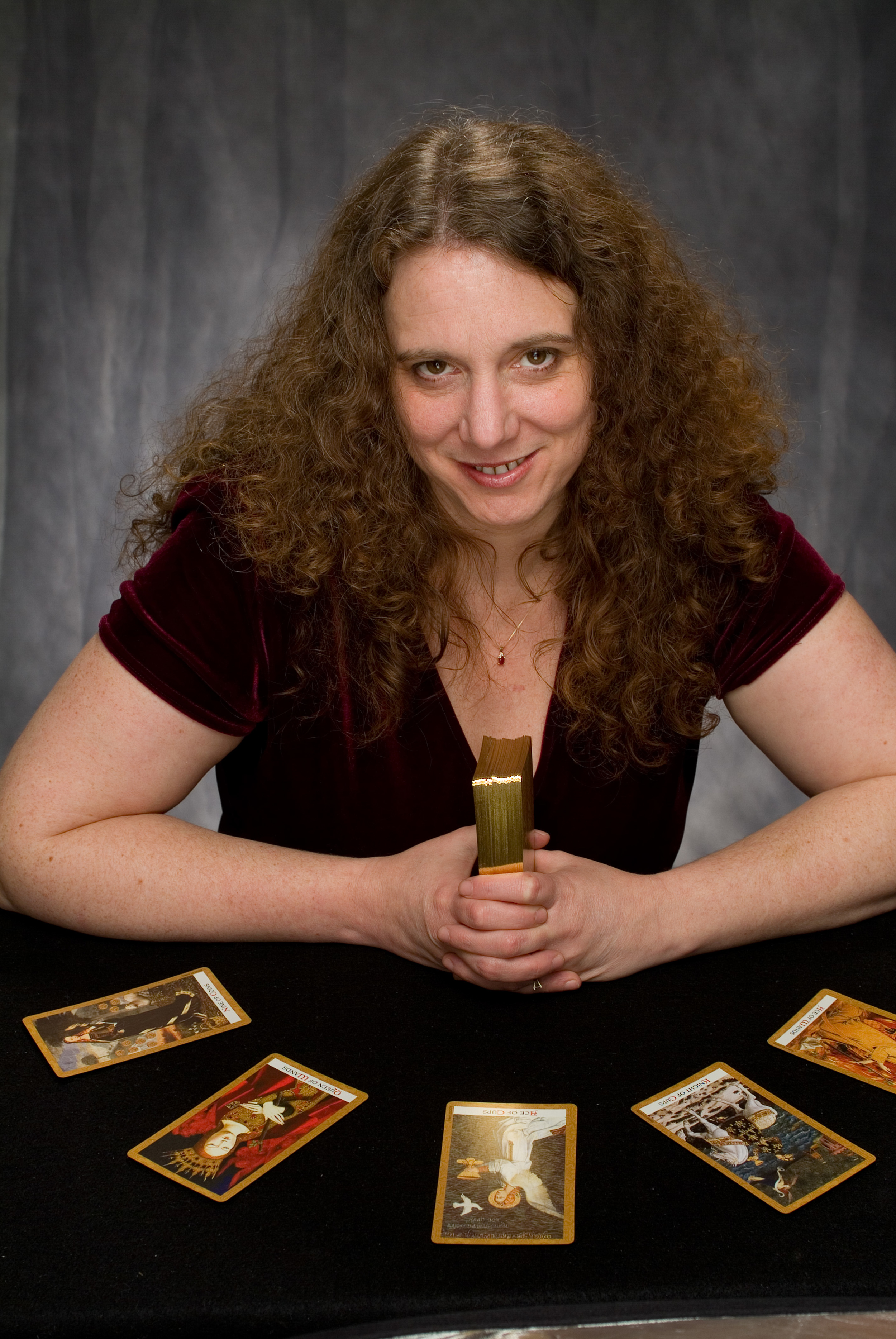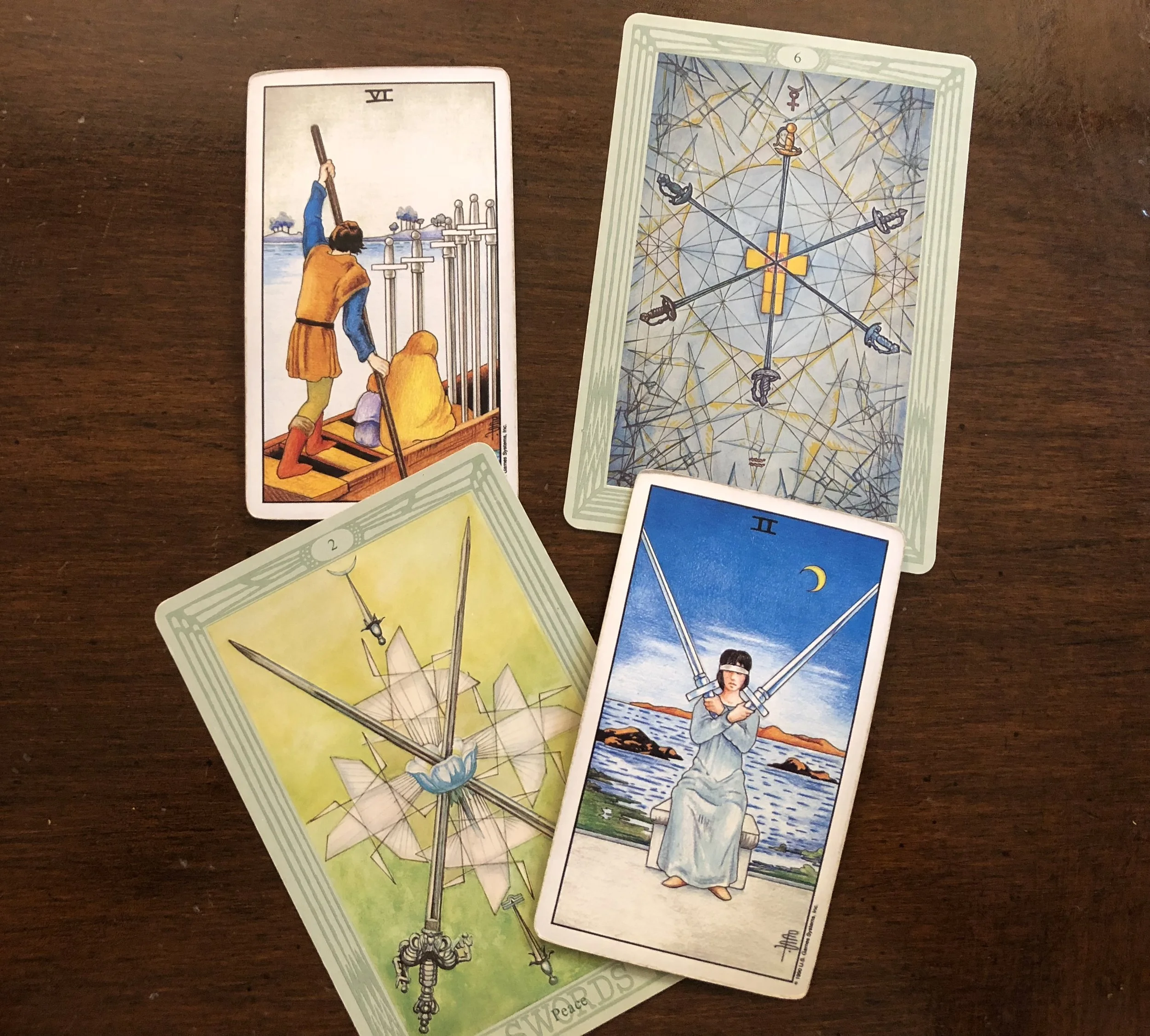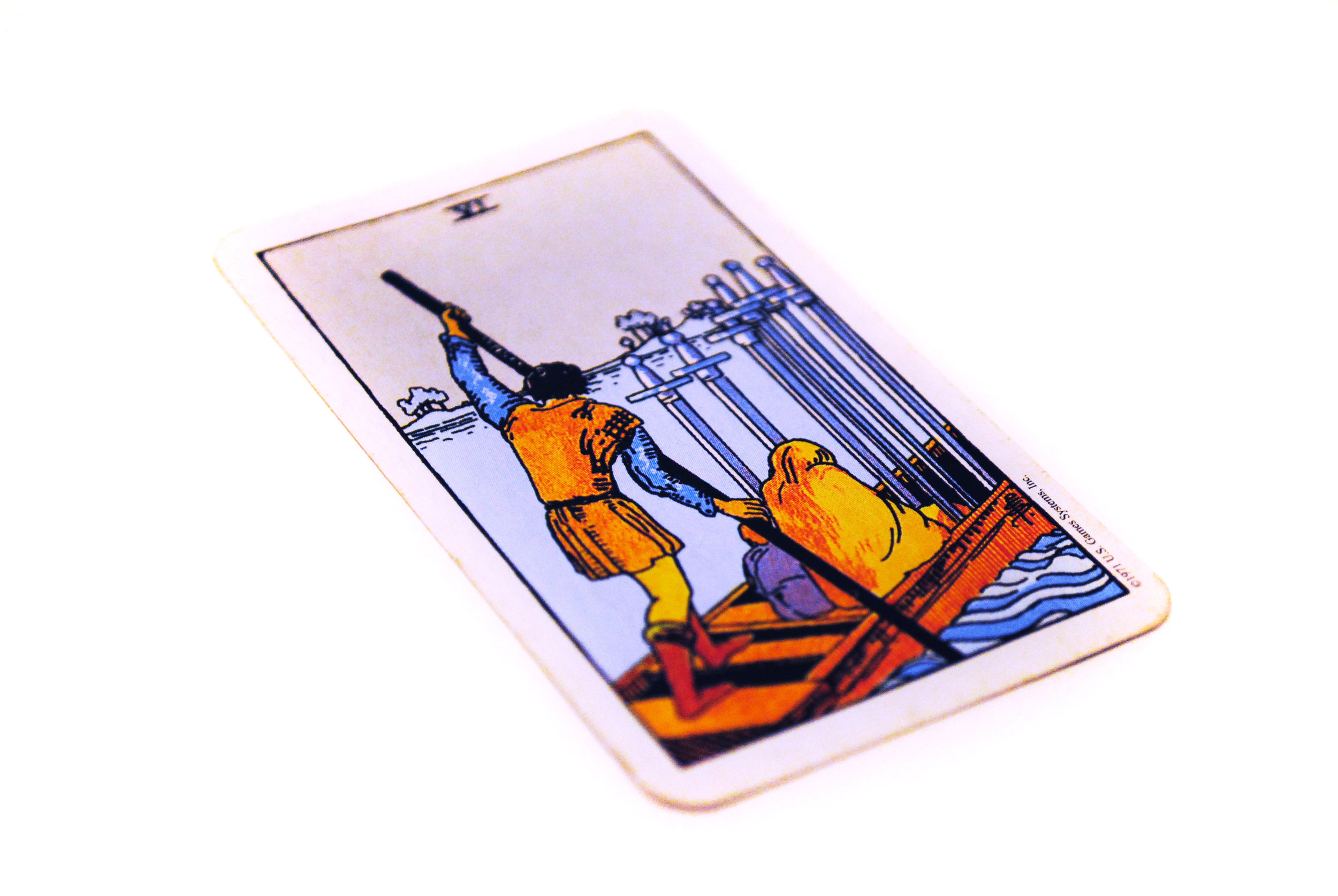
Welcome to my personal blog.
Here you will find my musings, thoughts and observations, all inspired by my experiences as a full-time professional tarot reader.
Compare and Contrast Eight of Cups and Six of Swords
Discover what these cards have in common, and how they differ.
An important exercise to learn and to understand tarot is to compare and contrast two cards which have something in common.
Two important things are true about the language of tarot. One is that each card carries unique energies and interpretations. The second is that each card will have some things in common with a few other cards.
Even beyond obvious associations like elements and numbers, some cards will bear similarities one to another. When cards that have similarities appear in a reading together, their collective meaning can become a theme of the reading.
For newer tarotists, however, these similarities can make it hard to understand the significant differences between the cards.
I’ve discussed this before, most recently in a post that suggests using venn diagrams to figure out similarities and differences between two or more cards.
The Eight of Cups and the Six of Swords are a good pair to try this exercise with. In terms of numbers and elements, they have little in common. Swords are masculine, Cups are feminine. Six and Eight are both even numbers, but not particularly similar in their energy.
Yet, we see enough similarity in these two cards that sometimes newer readers have a difficult time distinguishing their unique energies.
What are the similarities between the Six of Swords and the Eight of Cups?
In the Waite-Smith tradition, both images show motion. Both these cards can convey a sense of travel, either literally or metaphorically. They are usually less about the beginning of an important journey, as the Fool or the Chariot might depict. Instead, both of these cards are about moving away from something, toward something better.
In both of these cards, there can be a sense of needing to move away from emotional difficulty, toward a greater sense of calm.
Both these cards relate to water. The Six of Swords, though an Air card, is in a boat. The Eight of Cups is at a beach.
Both of these cards suggest that there has been some trauma or difficulty in the past.
Both of these cards suggest that it will take some time to move toward something better.
What is unique about the Six of Swords?
Traditional fortune tellers often see this card as predicting a ‘journey over water’. Aleister Crowley called the Six of Swords the card of ‘Science’. Even in the Waite image, we see how the swords of logical thought float over the water of emotion.
The Six of Swords can discuss science and technology.
In the Six of Swords, we are sailing toward smoother waters. This card includes an inherent prediction that things are getting better.
What is unique about the Eight of Cups?
While the Six of Swords seems to be sailing toward something, the Eight of Cups seems to be walking away from something. In this card we see abandonment. The Eight of Cups may refer to the damage done by childhood abandonment. It might suggest that we feel abandoned in a relationship. Or, it might suggest that it is time to abandon an unsuccessful undertaking.
Aleister Crowley called the Eight of Cups ‘Indolence’. From this perspective, we can see that the Eight of Cups might involve a desire to avoid a situation, or something that we don’t have the will or energy to complete.
Often in this card I see the emotional process of healing that comes when we stop trying to fix something that can’t be fixed.
The next time you are stuck trying to understand how two or more similar cards differ from one another, try this simple exercise and see how much you learn about each card’s distinct qualities, as well as their similarities.
Tarot Fusion
I am a Waite-Smith reader who uses some Crowley keywords. This is my confession.
I am a Waite-Smith reader who uses some Crowley keywords. This is my confession.
One of the things that separates the Crowley-Harris-Thoth deck from the Waite-Smith deck is the keywords on the Minor Arcana cards. To my knowledge, Crowley was the first to use printed keywords on the cards, though many card designers have followed suit (pun intended). Some decks use the actual Crowley keywords, some don't.
I am not a fan of all of Crowley's keywords. For example, I don't see the Seven of Disks/Pentacles as "Failure". I don't see the Five of Swords as "Defeat".
Yet, there are some Crowley keywords that I love. Those keywords have given me a more complete understanding of specific cards.
My two favorites are "Peace" for the Two of Swords and "Science" for the Six of Swords. I also love "Works" as opposed to "Work" for the Three of Pentacles.
When we look at the Waite Two of Swords we think of decision-making. Adding "peace" to that concept allows for a time when a decision can't yet be made. It gives us permission to be at peace with our indecision as we wait to hear our guidance.
The Waite Six of Swords clearly speaks of sailing toward smoother waters, but how are they doing that? What is making the waters smoother for them? This, for me, is where Crowley comes in. "Science" makes sense when we look at the Waite image. How are those swords staying up in the boat like that? The airy, logical swords are floating above the waters of emotion. For me, the "Science" keyword offers the advice inherent in this card. When this card appears, I often find that the way to those smoother waters is to think logically, scientifically, rather than emotionally.
I used to wonder if my cherry-picking of Crowley's tarot wisdom and adding it to my understanding of Waite's deck was something of a tarot abomination. Crowley and Waite hated each other in life. In fact, the Crowley tarot was in many ways an in-your-face response to Waite's publication of his deck. I've pondered on the relationship between Waite and Crowley before , wondering what it would have been like if they had had social media.
I have also wondered if my combining of tarot traditions might be frowned upon by traditionalists. It felt a little like invoking Celtic and Egyptian deities in the same ceremony.
Then I thought about my favorite fusion restaurant, where my husband could order steak and potatoes and I could order malai kofta.
There are times when the mixing of traditions and cultures can be confusing at best, and disrespectful at worst. There are other times when the mixing of traditions gives us the best of many worlds.
These days I don't think my brand of tarot fusion is confusing or disrespectful. For me, tarot reading is an operational thing. Whatever gives the best readings is the right thing to do. Adding a few resonant Crowley keywords to my Waite tarot vocabulary expanded my tarot practice exponentially.
This is particularly interesting at a time when many new tarot decks are being published and some of them with slightly (or, in some cases, grossly) different meanings than what we would consider classic.
I have heard a certain tarot wisdom that suggests we learn a deck creator's meanings for their deck, and refrain from using other interpretations. While it is certainly helpful to understand what a deck creator was thinking when they took a departure from traditional tarot, I don't think we are ever bound to a deck creator's concept of the cards.
In some ways, the body of tarot is a living thing. Any new deck or book adds to that body of knowledge.
I think we need to be free to use tarot knowledge wherever we find it, and apply it to whichever decks we prefer, regardless of the intent of the deck creators.
In this way, we allow tarot to be the best tool it can be, which is what any deck creator would want for their creation.
An Evening with the Six of Swords
What does it mean when the Six of Swords stalks two readers at a military fundraiser?
Last week I had the privilege of offering readings at a very special fundraiser. My friend Mary Ellen Collins and I were the tarot readers at the 6th Annual Chefs Helping Heroes Fundraiser for the Renewal Coalition, an organization that helps wounded veterans and their families.
One of the things that can happen while doing the “cattle call” (short readings for a line of people) is that many people in the group will receive the same card.
It usually takes me a little while to realize that a repetitive card at a party is speaking to the group, as well as to the individuals who receive it.
For instance, at a Bar Association gala almost everyone received Major Arcana 11, Justice. After the sixth one I realized that I was reading exclusively for attorneys and their spouses.
At an office Christmas party, just about everyone received the Six of Pentacles. “You are such a generous person” I said once, twice, three times. Then I asked what the nature of the business was. It turned out they distributed grants for student funding.
The repetitive card that came up at the Helping Heroes event was the Six of Swords. I must have seen that card for eight people, or more, in two hours. The funny thing is, it didn’t register for me until afterwards, when Mary Ellen asked me if I had seen the Six of Swords much that evening.
As a matter of fact, I had, and clearly, so had she!
Why was the Six of Swords such a predominate card for this audience? Many of the party attendees were active military, or veterans, and their families. Everyone was there in support of wounded warriors. Still, there are other cards I might have more readily expected to see.
I call the Nine of Wands “The Wounded Warrior”. But that wasn’t the card that presented itself so forcefully.
For me, the Six of Swords is often about sailing toward smoother waters. In fortune-telling tradition, the Six of Swords is “journey over water”. It came up for at least one person to discuss an upcoming deployment.
Aleister Crowley called the Six of Swords “Science”. It’s easy for me to connect that to the Waite-Smith image. The Swords are almost floating over the water, to remind us to value logic over emotion; the essential goal of the Scientific Method.
The Esoteric Title for the Six of Swords is “Lord of Earned Success”. That certainly makes sense for the audience, both in terms of military service as well as the obvious financial means of the generous people who supported the event. It was evident from the beginning that the event was a very successful fundraiser for the cause, so that could also be “earned success”.
The specific mission of the organization is to provide no-cost retreat getaways for recovering soldiers and their families. There is no doubt, anecdotally, that this program is saving marriages, and, perhaps, even saving lives.
The “retreat” card in tarot is Four of Swords. As I consider this, I see a story emerging that give the Six of Swords profound meaning for its persistent appearance that night.
When we look at the Three, Four, Five and Six of Swords we see the story of every wounded warrior. With Three, we see the actual injury. With Four, a time of rest and recovery, With Five, the battle that every solider fights when they leave the battlefield.
Finally, in the Six of Swords we see the resolution – the soldiers’ ability to heal by allowing themselves to return to a world that makes sense to them; a world different from the world of warfare.
The job of the Renewal Coalition is to provide a space of safe normalcy for those whose lives have been anything but normal.
Whether for a group in a single evening, or over a long period for an individual, repetitive cards (or “stalker cards” or “frequent cards”) are an interesting phenomenon.
Some of them, like the Devil that appeared in each of my readings long ago during an unhealthy relationship, are like a bitch-slap from the Universe, meant to wake you to a harsh reality.
Others, like the Six of Swords at this event, take some time to contemplate.
After the event, Mary Ellen and I wondered about the Six of Swords, and what its message might be.
We agreed to each blog about it.
Now that you have read my thoughts, visit Mary Ellen’s blog and see what she had to say!
Science
An interesting thing happening in our American culture is that "scientific" data seems more malleable than ever. There are powerful people in our country who seem unsure about everything from how women get pregnant to whether it's okay to genetically modify our food to whether people in ancient times might have used dinosaurs for transportation.
The problem is that these "new" ideas about science aren't coming from new research or new evidence. They are coming instead from a need to manipulate. They are motivated by political and economic expedience.
Those who use true scientific method are often scorned in favor of those whose theories people find more comforting. Perhaps Bill Nye is our modern-day Galileo.
Should true science ever be motivated by profit or politics? Tarot offers us an easy answer in the Six of Swords.
In tarot, Swords is the suit of rational thinking, intelligence, clarity and integrity. Many of the Swords cards carry difficult images. I am sure that over the years many rational thinkers have felt the ten swords in their backs, or the three swords in their hearts. It is not always easy to have intelligence and integrity in any society.
The number Six in tarot is the number of victory. In the Six of Swords, we see the victory of logic over emotion.
In the Crowley-Harris-Thoth Tarot, the key word printed on the Six of Swords is "Science."
In the Rider-Waite Smith Tarot we see a family in a small boat. They are literally sailed toward smoother waters; the water behind them is choppy while the water ahead is placid.
There are six Swords standing upright in the boat.
The Swords, symbol of logic, are moving above the water, which is the symbol of emotion.
The family is sailing to smoother water because they are choosing logic over emotion.
To me, a poignant message of the Six of Swords is this. Sometimes our journey is smoother when we trust the facts, and when we choose not to cloud them with emotion.
People feel an emotional attachment to their myths, and that's fine. But when we don't understand that our myths are myths, or when our emotional require us to manipulate facts, nothing can move forward.







